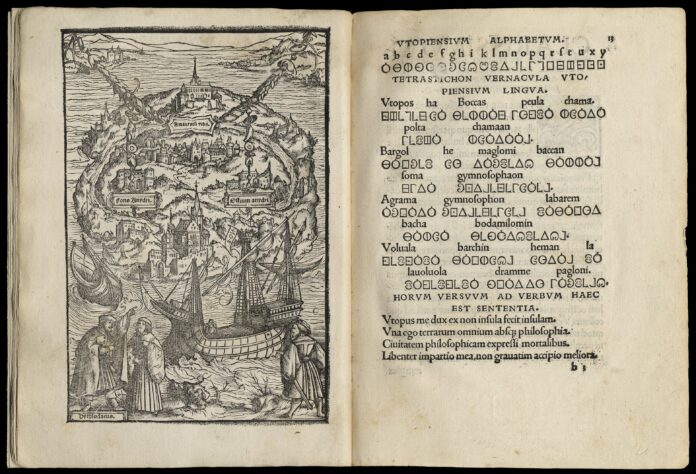
Socialistisk Biblioteks Tidslinje med links til begivenheder og personer i 1516.
Se også Index over personer, organisationer/partier og værker (som bøger, malerier, mm.), steder, begivenheder, mv., der er omtalt på hele Tidslinjen, titler og indhold på emnelisterne osv.
Januar 1516
Thomas More udgiver – iflg. titelbladet/impressum – bogen Utopia på latin, Libellus vere aureus, nec minus salutaris quam festivus, de optimo rei publicae statu deque nova insula Utopia [Om en republiks højeste stade og om den nye ø, Utopia]. Men bogen er snarere trykt i december 1515 (se Note**).
På dansk:
Utopia. Oversat og med indledning af Ernst Christiansen (Fremad, 1944, 176 s.)
Utopia. Oversat af Otto Foss og med forord af Villy Sørensen (Hans Reitzel, 1993, 139 s.)
Utopia. Oversat af Otto Foss og med forord af Clement Kjersgaard (Gyldendal, 2016, 179 s.)
Links:
Utopia (Book) (Wikipedia.org). With external links.
Thomas More: Utopia (Marxists Internet Archive)
The politics of Utopia. By Tom Bailey (Spiked Review, December 2016). Review of Joanne Paul, Thomas More (Polity Press, 2016, 180 p.). “A fascinating new study sheds light on Thomas More, the political thinker.”
From no place to our place””five hundred years of Utopia (Socialist Worker, Issue 2503, 10 May 2016). “Hassan Mahamdallie looks through history at how people’s dreams of a better society were born.”
Five hundred years of Utopia. By Ed Simon (Jacobin: Reason in Revolt, March 19, 2016). “Since its publication in 1516, Thomas More’s Utopia has helped us aspire to a just society.”
On Thomas More’s Utopia (1964). By Kenneth Rexroth (CounterPunch, July 14, 2007). “He is one of the very few thinkers ever to try to construct a model of a community of love while recognizing the fragility and recalcitrance of his material.”
Foreword to Thomas More’s Utopia (1893). By William Morris (Marxists Internet Archive). “Doubtless the Utopia is a necessary part of a Socialist’s library.”
Thomas More and his Utopia. By Karl Kautsky (London, AC Black, 1927, 250 p.; online på Marxists Internet Archive). “Although Utopia is more than four hundred years old, the ideals of More are not vanquished, but still lie before striving mankind.” See review by T.A. Jackson: Utopia and its author (Plebs, December 1934)
Se også på dansk:
Thomas More (Wikipedia.dk). Dansk artikel med links til længere engelske artikel.
Thomas More (Denstoredanske.dk)
More, Machiavelli, Marx, Mao og Mosen – et lille bidrag til utopiens historie. Af Benito Scocozza (Modkraft.dk, 9. juli 2002). Afskedsforelæsning som lektor på Institut for Historie, 15/2-2001.
Utopier (Leksikon.org)
Utopisk socialisme (Denstoredanske.dk)
Socialismens udvikling fra utopi til videnskab (1877). Af Friedrich Engels. Især kap I om udviklingen af de første socialistiske ideer, herunder Thomas Mores Utopia.
Sande utopister er kritikere – ikke profeter. Af Terry Eagleton (Information/Moderne Tider, 27. februar 2016, side 8-10). Med kritik af andre utopister som Charles Fourier + Daniel Defoe. Artiklen er p.t. ikke online, men er på engelsk nedenfor.
In English:
More, Thomas (1478-1535) (Marxists Internet Archive; Glossary of People)
Utopian Socialism Archive (Marxists Internet Archive)
Utopian socialism (Wikipedia.org)
Some socialist ‘ancestors’. Chapter 1, – in: The Two Souls of Socialism. By Hal Draper (New Politics, Vol.5, No.1, Winter 1966)
Utopias, past and present: why Thomas More remains astonishingly radical. By Terry Eagleton (The Guardian, 16 October 2015). With critic of other utopians, as Daniel Defoe + Charles Fourier (dansk udgave 27. februar 2016, se ovenfor).
Se også på Socialistisk Bibliotek:
Tidslinjen: 6. juli 1535, om Thomas More
Portrait of Sir Thomas More by Hans Holbien the Younger (1497/98-1543) The Frick Collection, New York)
**
Page 52 of the 2011 publication by Daniel T Lochman; Maritere LoÌpez and Lorna Hutson: Discourses and representations of friendship in early modern Europe, 1500-1700 asserts the publication date to be sometime in December, based on correspondence between Erasmus, More and other acquaintances: in November, Erasmus noted in a letter that he had seen it being prepared at the printers, and that the title page bears the date as 1516. Subsequent correspondence for this year discusses the reception of the book (though this *may* have been the manuscript copy which is no longer extant) but does not specify a particular day.
So it could be assumed that the printed edition was likely to have been in circulation circa December 1515 (Source mail til Modkraft Biblioteket October 2015 fra Rare Books and Music Reference Service/The British Library).



































